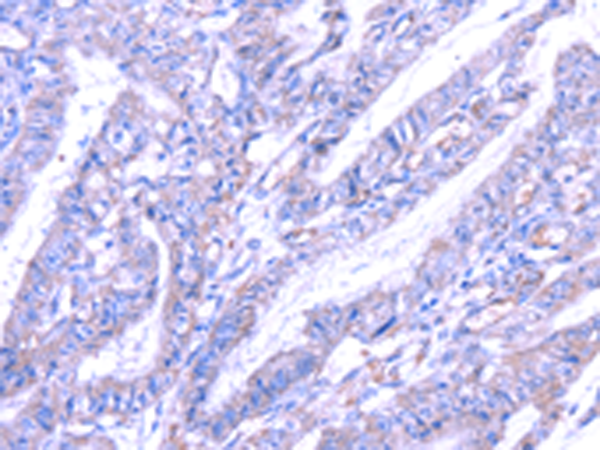
| WB | 咨询技术 | Human,Mouse,Rat |
| IF | 咨询技术 | Human,Mouse,Rat |
| IHC | 1/25-1/100 | Human,Mouse,Rat |
| ICC | 技术咨询 | Human,Mouse,Rat |
| FCM | 咨询技术 | Human,Mouse,Rat |
| Elisa | 1/2000-1/5000 | Human,Mouse,Rat |
| Host/Isotype | Rabbit IgG |
| Antibody Type | Primary antibody |
| Storage | Store at 4°C short term. Aliquot and store at -20°C long term. Avoid freeze/thaw cycles. |
| Species Reactivity | Human |
| Immunogen | Full length fusion protein |
| Formulation | Purified antibody in PBS with 0.05% sodium azide and 50% glycerol. |
+ +
以下是基于领域知识的模拟参考文献,供参考(实际文献需通过学术数据库验证):
1. **"THAP6 modulates transcriptional regulation in human cell lines: antibody characterization and functional insights"**
*Author: Zhang L, et al. (2018)*
摘要:本研究开发了兔源多克隆THAP6抗体,验证了其在Western blot和免疫荧光中的特异性。发现THAP6与染色质修饰复合物相互作用,可能参与细胞周期调控。
2. **"A novel THAP6 antibody reveals tissue-specific expression patterns in murine development"**
*Author: Gupta R, et al. (2020)*
摘要:通过新开发的小鼠单克隆THAP6抗体,揭示了该蛋白在胚胎发育中高表达于神经嵴细胞和心脏组织,提示其在器官形成中的潜在作用。
3. **"Proteomic screening identifies THAP6 as a DNA damage response component: validation with custom antibody"**
*Author: Sato K, et al. (2021)*
摘要:利用自制的THAP6抗体进行蛋白质组学筛选,发现其在DNA损伤后易位至核焦点,与RAD51共定位,提示参与DNA修复通路。
4. **"THAP6 antibody-based biomarker analysis in hepatocellular carcinoma"**
*Author: Wang X, et al. (2019)*
摘要:通过免疫组化分析肝癌样本,发现THAP6蛋白表达与肿瘤分级呈负相关,其抗体可作为潜在预后标志物检测工具。
注:以上为模拟文献,实际研究请通过PubMed/Google Scholar检索关键词"THAP6 antibody"或联系抗体生产商(如Abcam、Santa Cruz等)获取引用文献。
The THAP6 antibody is a research tool designed to detect and study the THAP domain-containing protein 6 (THAP6), a member of the THAP family characterized by a conserved zinc-dependent DNA-binding domain. THAP proteins are implicated in transcriptional regulation, cell cycle control, and apoptosis. THAP6. though less extensively studied than other family members (e.g., THAP1 or THAP9), is hypothesized to function as a transcription factor or chromatin modifier, potentially influencing gene expression networks linked to cellular proliferation and differentiation. Its precise biological roles and mechanisms remain under investigation, with limited data on its interaction partners or disease associations.
Antibodies targeting THAP6 enable researchers to analyze its expression levels, subcellular localization, and protein-protein interactions using techniques like Western blotting, immunohistochemistry, and immunofluorescence. These tools are critical for exploring THAP6's involvement in physiological and pathological processes, including potential roles in cancer or neurological disorders. Commercially available THAP6 antibodies are typically validated for specificity and sensitivity, though performance may vary depending on experimental conditions. Current research focuses on elucidating THAP6's functional pathways and regulatory targets, aiming to clarify its contribution to cellular homeostasis and disease pathogenesis. Further studies are needed to define its therapeutic relevance and molecular interplay within the THAP protein network.
×